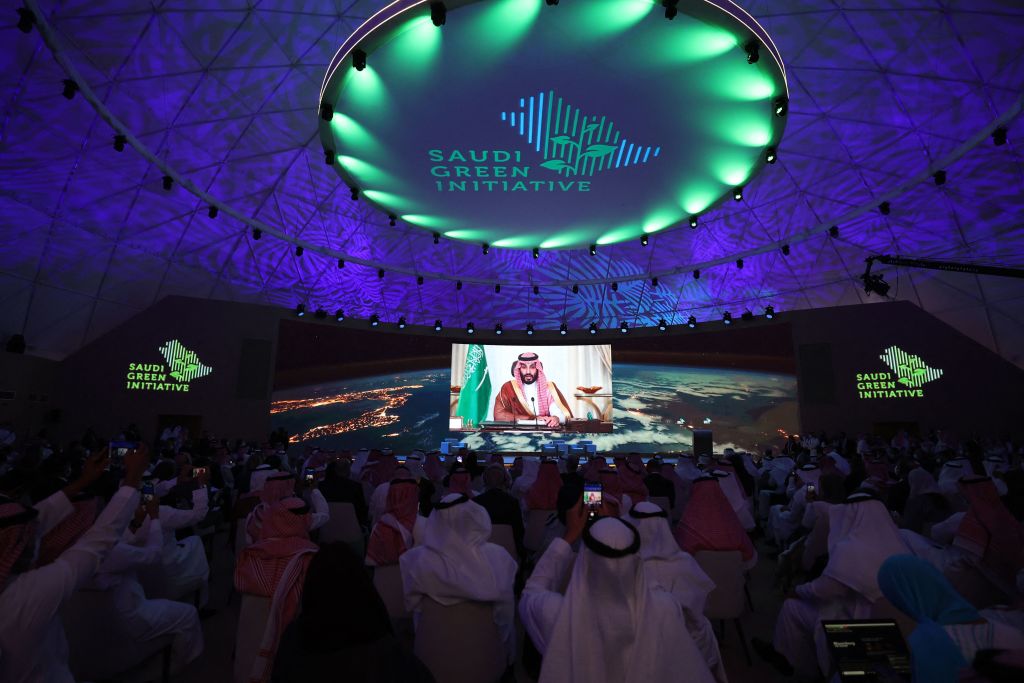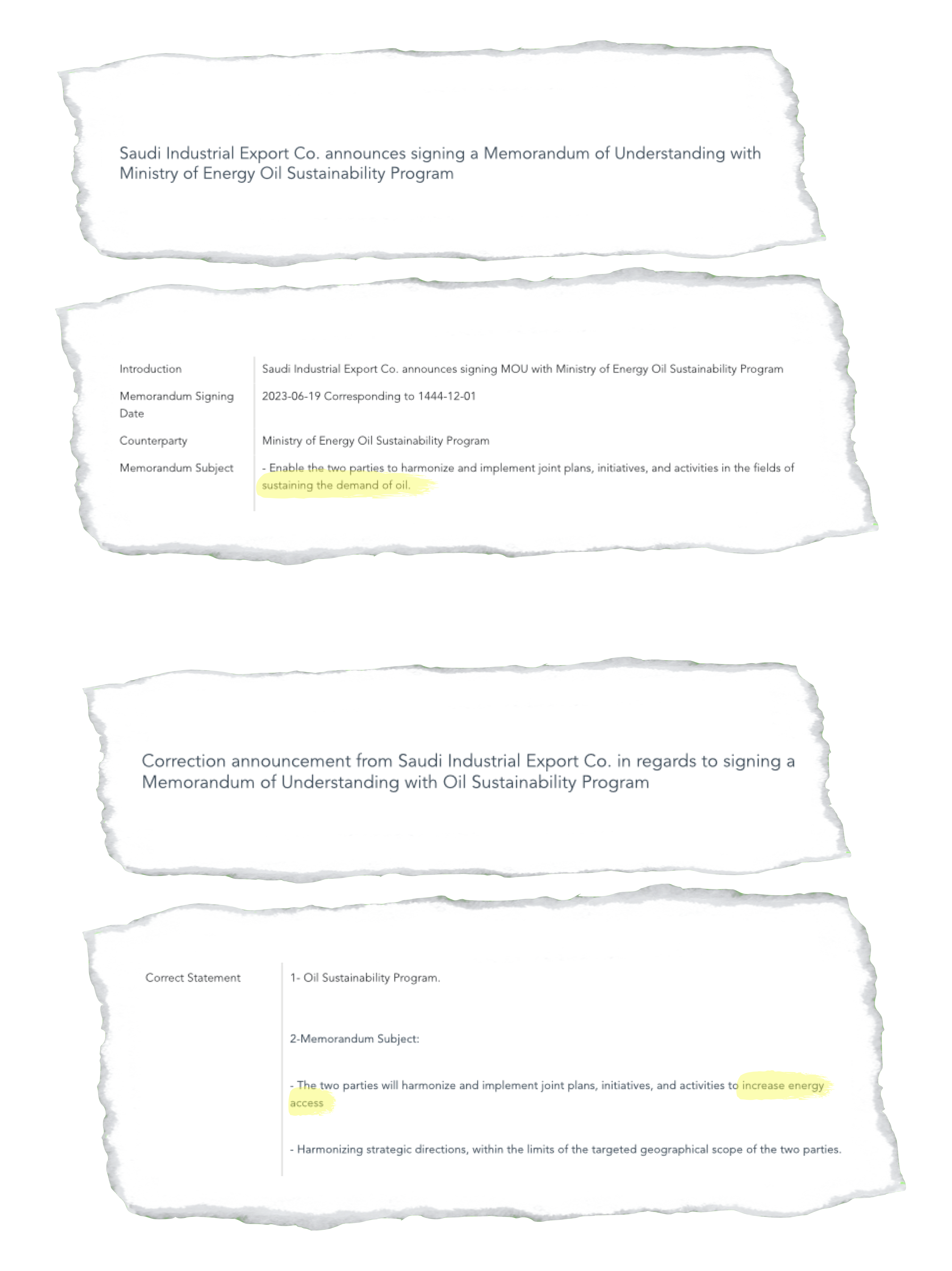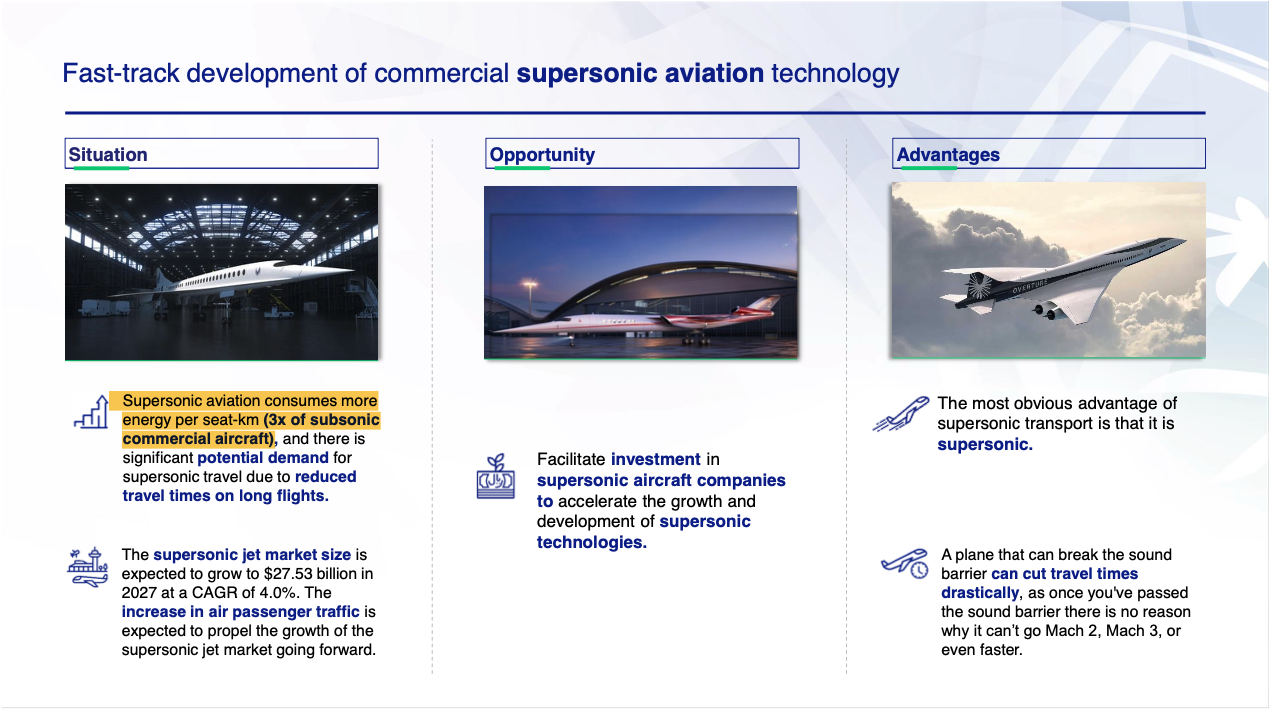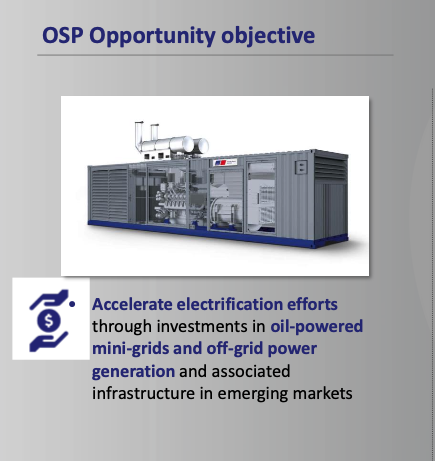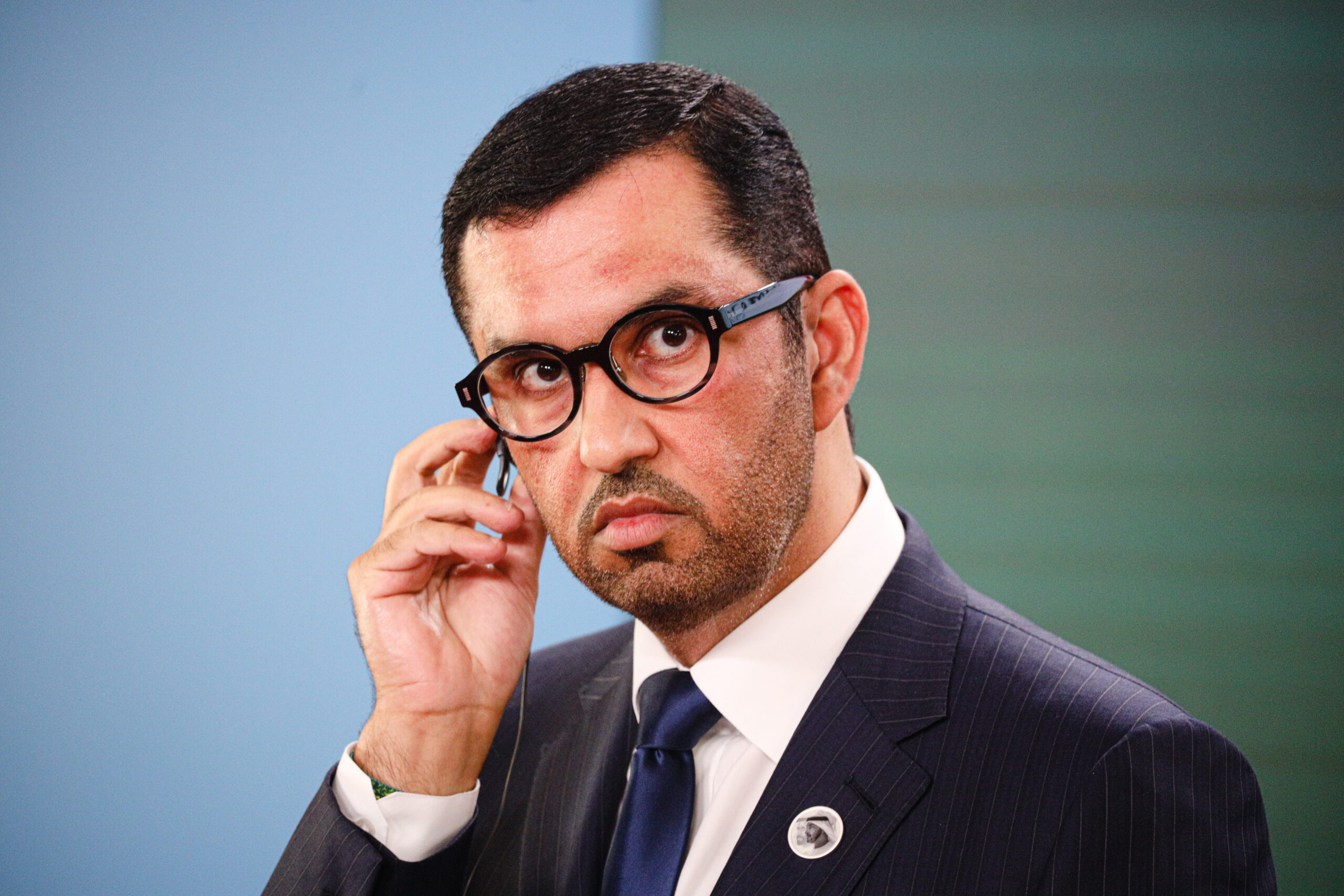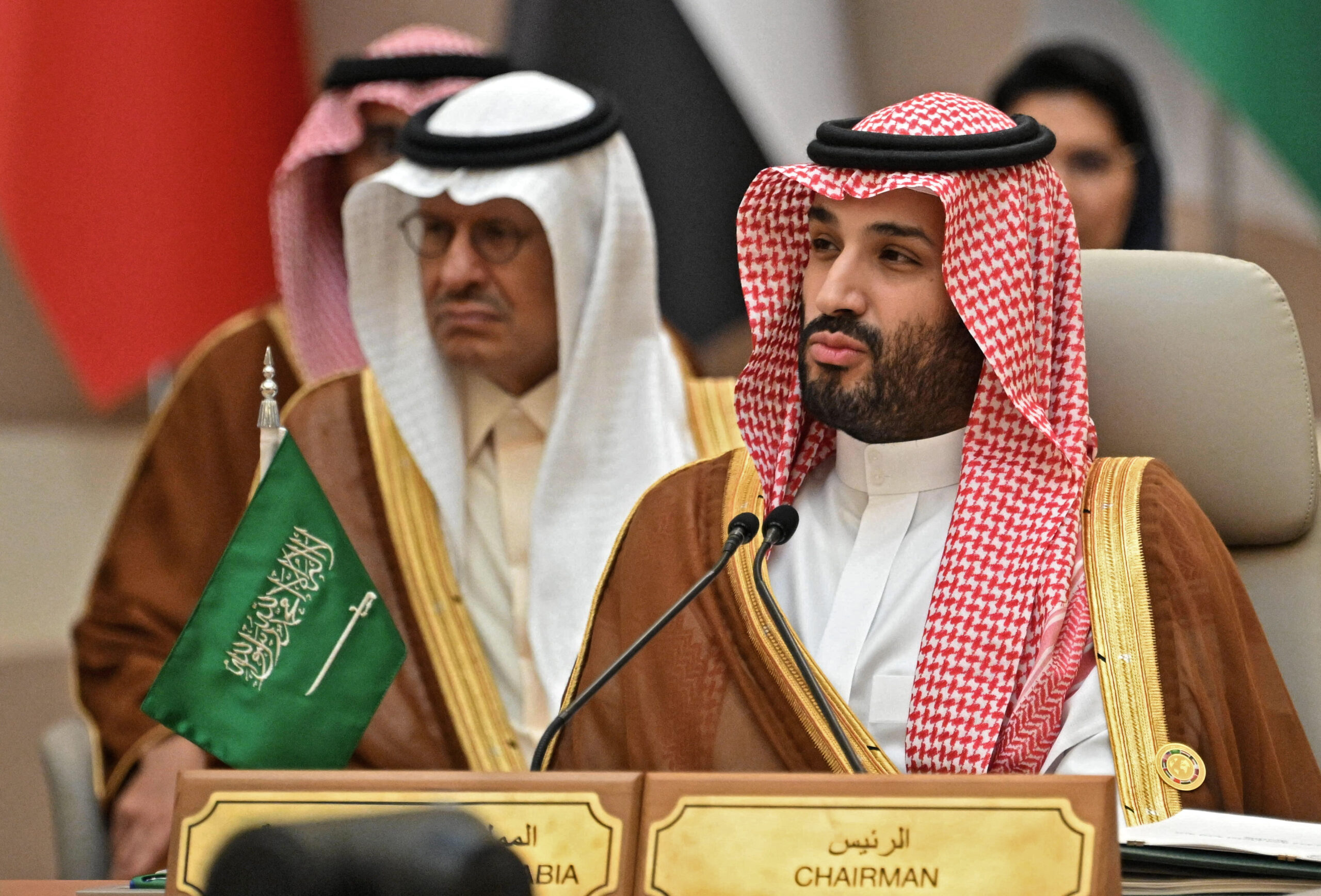
Crown Prince Mohammed bin Salman and his energy minister, Prince Abdulaziz bin Salman (background), oversee the Oil Demand Sustainability Program. Photo: MANDEL NGAN / AFP
Cheap cars, supersonic jets and floating power plants: Undercover in Saudi Arabia’s secretive program to keep the world burning oil
Speaking to undercover reporters, Saudi energy officials disclosed ambitious plans to undo progress on phasing out oil by financing high carbon infrastructure across Africa and Asia.
November 27, 2023
With
Saudi Crown Prince Mohammed bin Salman is overseeing a sweeping global investment program designed to counteract the world’s efforts to reduce demand for oil and tackle climate change, according to an undercover investigation by the Centre for Climate Reporting.
The program, which is chaired by the Crown Prince and his energy minister, Prince Abdulaziz bin Salman, aims to boost oil consumption across Asia and Africa, with the ultimate goal of protecting Saudi oil revenues from efforts to phase out fossil fuels.
Saudi Arabia publicly claims to support the Paris climate change agreement, which aims to limit global temperature increases to 1.5C or 2C – requiring an almost total transformation of the way in which the world produces and consumes energy. The Crown Prince, also known as MBS, has said that the Kingdom needs to go “further and faster” in tackling climate change.
But an undercover investigation by the Centre for Climate Reporting (CCR) reveals how, in private, the Kingdom is seeking to ensure that emerging economies across Africa and Asia become vastly more dependent on oil, not less.
The Oil Demand Sustainability Program (OSP) is a vast government program with dozens of projects aimed at embedding a high-carbon, fossil fuel-dependent development model in countries across Africa and Asia. This includes meticulously researched plans to drive a major increase in gasoline and diesel-fuelled vehicles and boost jet fuel sales via increased air travel.
“There’s a fundamental policy aim, which is to burn and exploit all Saudi’s oil reserves until the last drop”
It brings together the most powerful arms of the Saudi state, including the $700 billion Saudi Public Investment Fund; the world’s largest oil company, Saudi Aramco; petrochemicals giant, Sabic; and the Kingdom’s most important ministries – all under the auspices of the Crown Prince’s supreme committee of hydrocarbon affairs.
When asked by an undercover reporter whether the aim of the program is to artificially stimulate oil demand to counter global efforts to reduce oil consumption and tackle climate change, a Saudi official responded: “Yes… it is one of the main objectives that we are trying to accomplish.”
Following a six-month investigation, the Centre for Climate Reporting can – for the first time – reveal MBS’ secret plans to keep the world hooked on oil, even as the devastating impacts of global warming are beginning to bite.
The investigation, based on secret recordings, documents provided by Saudi officials to undercover reporters, and an analysis of regulatory filings, reveals:
- A sophisticated strategy to deploy fleets of petrol and diesel-fuelled vehicles across Asia and Africa so that Saudi Arabia can “capture the increasing gasoline/diesel demand.”
- Plans to collaborate with an undisclosed global auto manufacturer to develop and produce a cheap car that can be sold in emerging markets to give “an oil uplift for the kingdom.”
- Plans to fast-track commercial supersonic air travel, explicitly because it consumes three times more jet fuel than normal aircraft.
- A plan to lobby against government subsidies for electric vehicles in countries around the world.
- Plans to encourage the use of toxic heavy fuel oil to generate power in Africa and South Asia.
Responding to the investigation, Mohamed Adow, director of Power Shift Africa, a non-governmental organisation based in Nairobi focused on climate change, told CCR: “The Saudi government is like a drug dealer trying to get Africa hooked on its harmful product. The rest of the world is cleaning up its act and weaning itself off dirty and polluting fossil fuels and Saudi Arabia is getting desperate for more customers and is turning its sights on Africa.”
“It’s like the tobacco companies that knew the addictive and lethal nature of cigarettes yet continued to get millions of teenagers hooked on them,” Adow said, “it’s repulsive”.
Akinbode Oluwafemi, executive director of Corporate Accountability and Public Participation Africa (CAPPA), a civil society organisation headquartered in Lagos, told CCR that Africa needs “infrastructure that will reduce carbon emissions and not exacerbate the climate crisis.”
“This Saudi model is a Greek gift that will further sink Africa into climate catastrophe,” Oluwafemi said.
The Saudi Arabia energy ministry did not respond to a request for comment.
Saudi Crown Prince Mohammed bin Salman delivers a speech during the opening ceremony of the Saudi Green Initiative forum on October 23, 2021. (Photo by Fayez Nureldine / AFP via Getty)
Climate leader
Speaking at the launch of the Saudi Green Initiative in March 2021, Saudi Crown Prince Mohammed bin Salman, also known as MBS, said the Kingdom would become a leader on climate change. He pledged to reduce Saudi emissions to net zero by 2060 and to play a leading role internationally to tackle climate change.
“The Kingdom, the region and the world needs to go much further and faster in combating climate change,” MBS said, “Young people, both in the kingdom and the world, are demanding a cleaner, greener and more inclusive future, and we owe it to them to deliver on this.”
“OSP’s goal is to support the deployment of internal combustion engine fleets across developing countries”
Since then, the Kingdom has gone to great lengths to promote these commitments, with glossy promotional videos claiming the country is “leading the charge in tackling energy and climate challenges.”
Joanna Depledge, a Research Fellow at the University of Cambridge who has authored academic papers on Saudi climate obstruction, told CCR that, despite a recent shift in tone, little has changed in the way Saudi Arabia approaches the climate change: “There’s everything you can possibly do except for reducing oil and gas production and consumption. Every single trick in the book.”
“It’s all part of the delay,” Depledge said, “I think basically there’s a fundamental policy aim, which is to burn and exploit all Saudi’s oil reserves until the last drop. That’s what they plan to do but that involves, obviously, a delaying of the climate change agenda and that’s what they’re doing. And all this can help to delay it.”
At the same time as developing the Saudi Green Initiative, MBS has overseen the development of a program designed to reverse global progress on phasing out oil, something scientists say is crucial if the world is to avoid the worst impacts of climate change.
Sustainable development
Only a small amount of information about the Oil Demand Sustainability Program (OSP) is publicly available. On its website and social media channels, the Saudi energy ministry largely characterises the OSP as a sustainable development initiative aimed at providing energy access to emerging economies.
Regulatory filings seen by CCR suggest that this characterisation is part of a deliberate strategy to avoid public communications that might suggest the program’s primary aim is to boost Saudi oil sales. Filings on the Saudi stock exchange show that a May announcement of a deal between OSP and another state entity, the Saudi Industrial Export Company, was corrected because it accidentally referred to boosting oil demand, rather than fostering energy access.
In the first version of the announcement, the objective of the partnership was described as being “sustaining the demand of oil.” A day later a correction was issued, with this wording removed and replaced with “increase energy access.”
CCR also found significant differences in the way the program is presented to English and Arabic speaking audiences, including its name. The English version of the Saudi energy ministry website states that the initiative is called the “Oil Sustainability Program” and says its mission is to ensure that “hydrocarbons remain part of the global energy mix in the most efficient and sustainable way.”
On the Arabic version of the website, the word sustainable appears to have a completely different meaning. The initiative is called برنامج استدامة الطلب على البترول which translates to “Oil Demand Sustainability Program.” It says its purpose is to “sustain and develop the demand for hydrocarbons” and ensure “that the transition in the energy mix takes place in an effective manner, sustainable for the Kingdom of Saudi Arabia.”
Cape Town
In May 2023, Mohammed Al Tayyar, head of the OSP, took to the stage at the annual conference of the African Refiners & Distributors Association, a members-only event in the suburbs of Cape Town. He came with a message for the assembled politicians and oil executives: “come and work with us.”
According to documents and audio recordings obtained by CCR, Al Tayyar travelled to South Africa to pitch OSP as a sustainable development solution to Africa’s infrastructure problems, explaining how Saudi Arabia could help increase access to energy and facilitate investment in roads, airports, and the cars and planes to make use of them.
“We are actually conducting some studies to understand the psychological behaviour of these countries”
Al Tayyar said that his team had developed forty-six projects, or “opportunities,” and hundreds of pages of business development strategy. The plan, he said, is to engage with stakeholders, ranging from governments and companies to international investment funds, to make them a reality.
Following the Cape Town conference, undercover journalists for the Centre for Climate Reporting contacted the OSP officials who had travelled to South Africa to set up a meeting. The aim was to find out more about a program which, on the surface, appears to be about helping countries in Africa and Asia to grow their economies, but which appeared to be oriented around solutions that benefit the Saudi economy.
The pitch
Posing as international investors interested in funding some of the projects identified by Al Tayyar, CCR reporters attended a remote video conference with Saudi officials in Riyadh, who pitched the program’s key projects as potential areas for collaboration. During this private pitch, Saudi officials presented a different image of the OSP, based on slides not shown by Al Tayyar in Cape Town, which revealed an overriding objective to boost sales of Saudi oil.
The OSP officials detailed a vastly ambitious scheme, with plans to channel investment into ports, airports and roads across Asia and Africa, while ensuring that the ships, aeroplanes, cars and buses that use this infrastructure are powered by Saudi oil rather than cleaner forms of energy.
One of the officials, Nawaf Al-Fallaj, told the undercover reporters that the program’s forty-six projects had been selected from an initial batch of eighty, based partly on the scale to which they could boost oil demand, something he described as their “incremental demand potential”. He added that Saudi Arabia plans to deploy its sovereign wealth funds and diplomatic influence to make these projects a reality.
A slide deck shared on the call states that the strategy underpinning the program is to “unlock demand in emerging markets.” Undercover reporters asked the officials on the call if the aim is to artificially stimulate demand in emerging markets in order to offset a decline in oil demand due to efforts to tackle climate change. “Yes”, Al-Fallaj replied, “it’s one of the main objectives that we are trying to accomplish.”
Increasing demand
At the heart of the program is a plan to make sure that people around the world continue to drive diesel and petrol fuelled vehicles rather than switching to electric.
Saleh Aldayel, one of the OSP officials on the call, told undercover reporters that the plan is to facilitate investment in highways across Africa and Asia and to then fill these roads with vehicles that depend on oil. “In [the] case of roads, we aim to accelerate and enhance the impact and adoption of internal combustion engine technology,” Aldayel said
OSP officials were explicit about why Saudi Arabia wants to increase the number of oil-fuelled vehicles on the road, a slide deck shared by Aldayel states: “OSP’s goal is to support the deployment of ICE [internal combustion engine] fleets across developing countries to capture the increasing gasoline/diesel demand.”
This includes the development of ride hailing companies and local and regional bus companies. “OSP’s goal is to support the deployment of bus transportation across developing countries to capture the increasing diesel demand,” the presentation states.
Crucially, OSP officials said that they are in discussions with an undisclosed global auto manufacturer to develop cheap mass market cars that run on petrol or diesel and can be sold at scale in emerging markets. This would, Aldayel’s presentation says, “have an oil uplift for the kingdom.”
Aldayel explained there is “an opportunity for increasing availability and adoption of low-cost cars, especially in emerging markets.” This could, he said, either be through a joint venture with a car manufacturer or via micro-financing.
When undercover reporters asked for more information about the program, such as the scale of investment OSP would be undertaking and how much more oil Saudi Arabia wants to sell, they were told they would need to sign a non-disclosure agreement. But the Saudi officials did outline the detailed work that is going into the project, including psychological studies in emerging economies and mapping existing infrastructure in order to best target markets with cheap oil-fuelled vehicles.
“We are actually conducting some studies to understand the psychological behaviour, the infrastructure readiness of these countries, what type of cars are possible to be deployed there and even the financial capabilities of certain countries,” Aldayel said.
“So, it’s different from country to country. You can deploy two-wheelers in some countries, in other countries or other regions, you cannot go with the two-wheelers you have to have 4×4 cars, the smaller ones, the ones that are cheaper with not the advanced features that is more appealing for more developed countries,” he continued, “and we build a model that suits that country.”
Unfair
OSP officials also made it clear that Saudi Arabia sees the spread of electric vehicles (EVs) as a threat. They complained that EVs are being favoured with subsidies and other “regulatory advantages” and suggested that they might not even be better for the climate than internal combustion engine vehicles (ICEV).
“You know the situation that EVs are being favoured in terms of subsidies and regulatory advantage, irrespective of the actual economic and environmental competitiveness,” Aldayel said, “what we are working on is to support, to increase internal combustion engine adoptions… promoted through fair policies by working with regulators and industry leaders.”
The presentation shared by OSP officials claims that “global emissions regulations can be met by improved internal combustion engine vehicles and fair regulations.” It says this can partly be achieved through Saudi diplomacy, or “Kingdom relations,” and work with industry and regulators to promote internal combustion engine vehicles “through science and fair policies.”
“Obviously aviation is a key market for them”
The presentation shared by officials on the call describes a program of “regulatory advocacy” to “shape local and international viewpoints for policymakers,” “promote fair policies,” and “ensure the Kingdom’s view is represented in relevant global forums.”
A 2021 New York Times investigation found that Saudi Aramco has funded huge amounts of scientific research into contentious energy issues in recent years, including studies aimed at keeping petrol and diesel vehicles competitive or casting doubt on electric vehicles.
Al-Tayyar, the head of OSP, told his Cape Town audience that the mining that is required for EVs will also create emissions, adding “so, we need to be very careful in pushing hard on one mode versus the other. Our view on which we base all of our efforts is having a more inclusive approach, we will need all of the above to help increase connectivity and mobility globally and Africa is a prime example for that ability to do so.”
Supersonic flight
Saudi Arabia is also a major retailer of jet fuel and OSP officials outlined plans aimed at increasing sales around the world. This includes a plan to help fast-track the commercialisation of supersonic air travel, something that hasn’t been seen the demise of Concord.
The presentation makes clear that the incentive for doing so is that “supersonic aviation consumes more energy”, detailing that it uses three times the energy of subsonic commercial aircraft.
In October 2023, Saudi Arabia’s $500 billion NEOM project announced that it had made an investment in Boom Technology, a $700 million start-up that aims to make commercial supersonic air travel a reality by 2030.
OSP also plans to facilitate investment into low-cost airlines in emerging economies across Asia and Africa. The presentation states that OSP could “facilitate investment in existing low-cost carriers with potential for expansion to fund growth through the acquisition of new aircraft and routes.”
To help manage the climate impacts of these plans, OSP officials said that Saudi Arabia is investing in an optimised jet fuel with at least 10% less greenhouse gas emissions compared to conventional jet fuel.
Joanna Depledge told CCR that Saudi obstruction has led to very little action on tackling emissions from aviation: “It’s really quite extraordinary what they’ve got away with,” she said, “they’ve just said no, even to any debate.”
“Because obviously, aviation is a key market for them,” Depledge said.
Slide from OSP presentation
Floating power plants
In addition to transport, Saudi Arabia is also hoping to increase the use of fossil fuels for generating electricity in developing countries. The presentation portrays this as a sustainable development initiative, but the proposed solutions depend upon countries importing Saudi diesel and highly polluting heavy fuel oil.
This includes a plan to create “oil-powered mini-grids” in landlocked countries across Africa and South Asia. Nawaf Al-Fallaj told undercover reporters the plan is “comprised of mini-grid and off-grid power generation and includes the use of diesel and HFO [heavy fuel oil] and hybrid systems also.”
“Africa has the largest potential for green energy, why can’t the Saudis fund the development of those types of infrastructure”
OSP officials also outlined a plan to use “floating power plants” off the coast of Sub-Saharan Africa and South Asia. Power ships use heavy fuel oil or liquefied natural gas – usually whichever is cheapest at the time – to generate electricity. They have proven controversial in the past, with countries locked into high cost contracts and burning highly polluting heavy fuel oil in close proximity to towns and cities.
The officials added that, as part of the OSP strategy, Saudi Arabia would be accelerating upgrades to its heavy fuel oil refining capacity.
Image from OSP presentation
Leapfrogging
When asked by an undercover reporter if the Saudi strategy is to ensure that developing countries don’t “leapfrog” fossil fuel-based development in favour of cleaner options like renewable energy and electrified transport, a Saudi official smiled and said “actually, we don’t believe it’s possible that they can skip this phase.”
Mohamed Adow of Power Shift Africa told CCR: “I will strongly disagree with anyone who says that Africa can’t leapfrog. Africa has all the essential ingredients to allow it to move away from fossil fuels.”
“But we need investment from rich countries that claim to be climate leaders,” Adow said, “otherwise we can expect more dodgy deals like this one, which endangers not just Africans but the global effort to ensure a safe and prosperous climate for all.”
Akinbode Oluwafemi of CAPPA told CCR: “As an African, I feel insulted that the Saudis think Africa is not ripe for a green economy and just transition. What Africa needs is sustainable climate financing that will allow the continent to make the transition to a climate resilient economy.”
“Africa has the largest potential for green energy, why can’t the Saudis fund the development of those types of infrastructure,” Oluwafemi said.
Putting it into action
Earlier this month, Saudi energy minister, Prince Abdulaziz bin Salman, signed memoranda of understanding with Rwanda, Nigeria, Chad, Ethiopia and Senegal during a diplomatic conference in Riyadh.
The agreements were part of an OSP initiative called “Empowering Africa,” which is framed as a sustainable development program that will fund electric cooking stoves and introduce “connectivity solutions, e-education platforms, and e-health services to rural areas in Africa.”
But the memoranda of understanding struck by Abdulaziz bin Salman this month as part of the initiative appear to largely focus upon oil and gas supply. This includes a deal between the OSP and Rwanda to “develop demand for hydrocarbon resources” and an agreement with Ethiopia to “cooperate on oil supply”. An agreement with Nigeria also focuses on cooperation in the oil and gas sector.
Significantly, the Saudi energy minister is reported to have framed the initiative as an alternative to the Green Climate Fund, which was set up as part of the UN climate process to support developing countries to transition to cleaner forms of energy and transport. According to Saudi newspaper, Arab News, Prince Abdulaziz bin Salman said at the event: “we have asked many of our colleagues in Africa if they have received any of the climate fund. I have yet to hear any who have.”
“Economies of Africa need to grow,” he added, “the people of Africa need to prosper, if these two things happen the world economy will grow and there will be a rippling effect.”
According to Adow: “A just transition is what Africa requires and Africans need to be proactive and ensure that the narrative of a just transition is not appropriated by polluters. We don’t want Africa’s poverty and Africa’s low emissions used to now undermine Africa’s future development.”
“I think the dominant narrative is that Africa lacks the resources,” Adow said, “and so you can then justify any infrastructure development including dirty development on that basis. But what that misses is – if you look at the history of the world and the fossil heavy development that powered the advanced economies – that is what caused the climate crisis in the first place. And so, as the most vulnerable geography but also the one that is incredibly blessed with renewables, Africa can avoid the pitfalls of the past and realise the new opportunities of the twenty-first century.”
Related
